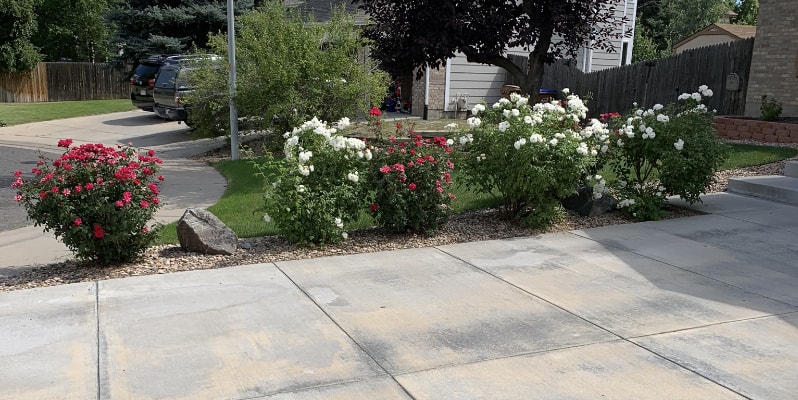Roses Providing Nice Frame for a Driveway
In my landscaping design and installs, I really like the use of roses to bring a design together. While this was an Arvada landscaping project, these roses are ideally suited for Colorado’s climate – no matter where you live along the front range.
In the photo below, you can see that I have alternating double knockout roses – and iceberg roses. I really like the alternating red-white look that using both types of roses provides.

Double Knock Out Roses
Roses are notoriously hard to grow and maintain, but the double knock out roses are different. They’re hardy enough to survive colorado’s climate and are disease resistant. Best of all is that they’ll bloom on and off from spring until our first freeze in early fall.
They do require quite a bit of sunlight for success, but Colorado provides more than ample sunlight for the double knock out to thrive.
Iceberg Roses
Iceberg roses are white and grow around 3-4 feet wide and just about as high. They also do great in Colorado’s hot, dry climate. They’re disease resistant and like a lot of sunshine, just like the double knockouts. They have frequent blooms from spring to fall and aren’t overly aromatic.
Maintenance for Roses
For both Iceberg and Double Knock Out roses, some maintenance is required for them to maintain their beautiful presence.
Watering: It is recommended that you water your roses frequently as our arid climate here in Colorado can drain plants of moisture quickly.
Pruning: You’ll want to make sure that you keep your rose bushes pruned somewhat regularly. If not kept in check, both iceberg and double knockout roses can take up quite a bit of space and begin to become unruly. The best time to prune the roses is usually after the first week in May (when the last frost generally occurs).
Mulching: Related to watering, you’ll want to make sure that you have a good layer of mulch around the base of your rose bushes. This will help keep the soil moist and keep your rose bushes healthy.
Fertilization: We recommend fertilizing your roses, but only after their first bloom. Fertilization generally isn’t necessary except right after blooms – even then you should probably cease fertilizing with the onset of fall as additional growth isn’t necessary or desired.